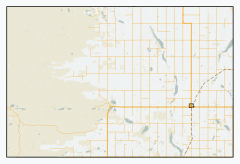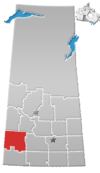Rural Municipality of Pittville No. 169
Pittville No. 169 | |
|---|---|
| Rural Municipality of Pittville No. 169 | |
 Location of the RM of Pittville No. 169 in Saskatchewan | |
| Coordinates: 50°26′53″N 108°44′28″W / 50.448°N 108.741°W[1] | |
| Country | Canada |
| Province | Saskatchewan |
| Census division | 8 |
| SARM division | 3 |
| Formed[2] | January 1, 1913 |
| Government | |
| • Reeve | Larry Sletten |
| • Governing body | RM of Pittville No. 169 Council |
| • Administrator | Terry Erdelyan |
| • Office location | Hazlet |
| Area (2016)[4] | |
| • Land | 1,258.06 km2 (485.74 sq mi) |
| Population (2016)[4] | |
• Total | 208 |
| • Density | 0.2/km2 (0.5/sq mi) |
| Time zone | CST |
| • Summer (DST) | CST |
| Postal code | S0N 1E0 |
| Area code(s) | 306 and 639 |
| Highway(s) | Highway 332 |
The Rural Municipality of Pittville No. 169 (2016 population: 208) is a rural municipality (RM) in the Canadian province of Saskatchewan within Census Division No. 8 and SARM Division No. 3. Located in the southwest portion of the province, it is northwest of the town of Gull Lake.
History
[edit]The RM of Pittville No. 169 incorporated as a rural municipality on January 1, 1913.[2]
Geography
[edit]Communities and localities
[edit]The following urban municipalities are surrounded by the RM.
The following unincorporated communities are located in the RM.
- Localities
Parks and recreation
[edit]Demographics
[edit]In the 2021 Census of Population conducted by Statistics Canada, the RM of Pittville No. 169 had a population of 201 living in 81 of its 93 total private dwellings, a change of -3.4% from its 2016 population of 208. With a land area of 1,256.42 km2 (485.11 sq mi), it had a population density of 0.2/km2 (0.4/sq mi) in 2021.[7]
In the 2016 Census of Population, the RM of Pittville No. 169 recorded a population of 208 living in 82 of its 107 total private dwellings, a 2% change from its 2011 population of 204. With a land area of 1,258.06 km2 (485.74 sq mi), it had a population density of 0.2/km2 (0.4/sq mi) in 2016.[4]
Government
[edit]The RM of Pittville No. 169 is governed by an elected municipal council and an appointed administrator that meets on the second Tuesday of every month.[3] The reeve of the RM is Larry Sletten while its administrator is Terry Erdelyan.[3] The RM's office is located in Hazlet.[3]
Standing Rock
[edit]Standing Rock (50°23′40″N 108°41′09″W / 50.3944°N 108.6857°W) is a large glacial erratic left from the last ice age around 14,000 years ago. It is composed of granite from the Hudson Bay area and is 3.35 m (11.0 ft) high and 9.14 m (30.0 ft) long. It is about 6 kilometres (3.7 mi) west of Hazlet along Highway 332. It was used as a scratching post for bison for centuries, and as a landmark by First Nations and later on by early settlers. It is a recorded petrograph site and is now a historical site.[8][9]
Transportation
[edit]Highways within the RM include:
See also
[edit]References
[edit]- ^ "Pre-packaged CSV files - CGN, Canada/Province/Territory (cgn_sk_csv_eng.zip)". Government of Canada. July 24, 2019. Retrieved May 23, 2020.
- ^ a b "Rural Municipality Incorporations (Alphabetical)". Saskatchewan Ministry of Municipal Affairs. Archived from the original on April 21, 2011. Retrieved May 9, 2020.
- ^ a b c d "Municipality Details: RM of Pittville No. 169". Government of Saskatchewan. Retrieved May 21, 2020.
- ^ a b c "Population and dwelling counts, for Canada, provinces and territories, and census subdivisions (municipalities), 2016 and 2011 censuses – 100% data (Saskatchewan)". Statistics Canada. February 8, 2017. Retrieved May 1, 2020.
- ^ "Saskatchewan Census Population" (PDF). Saskatchewan Bureau of Statistics. Archived from the original (PDF) on September 24, 2015. Retrieved May 9, 2020.
- ^ "Saskatchewan Census Population". Saskatchewan Bureau of Statistics. Retrieved May 9, 2020.
- ^ "Population and dwelling counts: Canada, provinces and territories, census divisions and census subdivisions (municipalities), Saskatchewan". Statistics Canada. February 9, 2022. Retrieved April 13, 2022.
- ^ Baird, Craig (May 18, 2022). "The History of Hazlet". Canadian History Ehx. Meks. Retrieved January 26, 2023.
- ^ "Standing Rock Natural Phenomenon". Tourism Saskatchewan. Government of Saskatchewan. Retrieved January 26, 2023.


